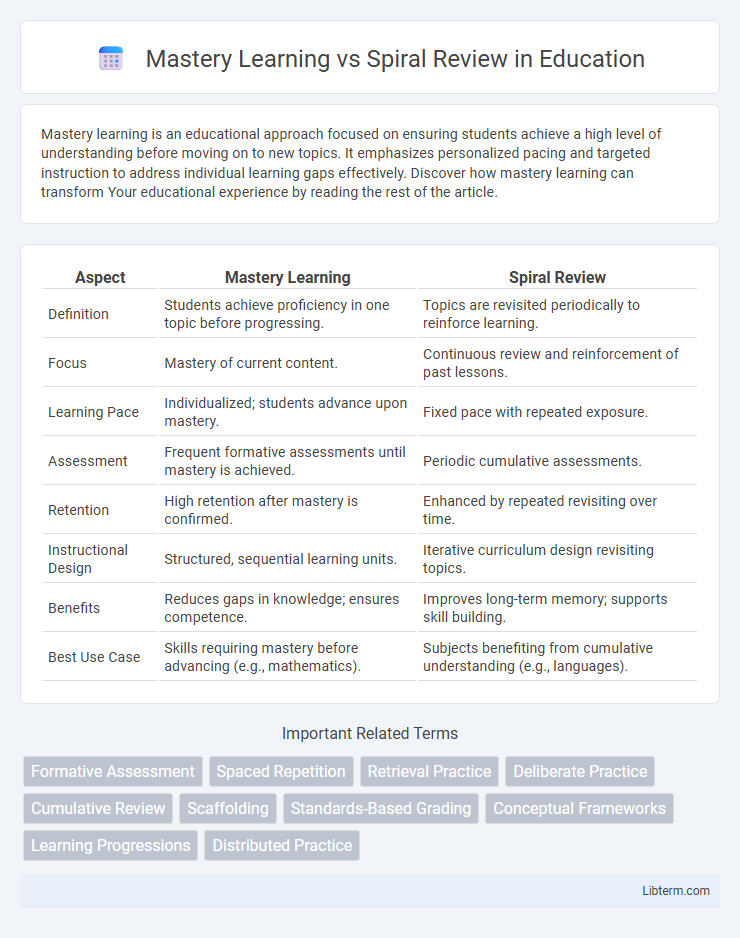Mastery learning is an educational approach focused on ensuring students achieve a high level of understanding before moving on to new topics. It emphasizes personalized pacing and targeted instruction to address individual learning gaps effectively. Discover how mastery learning can transform Your educational experience by reading the rest of the article.
Table of Comparison
| Aspect | Mastery Learning | Spiral Review |
|---|---|---|
| Definition | Students achieve proficiency in one topic before progressing. | Topics are revisited periodically to reinforce learning. |
| Focus | Mastery of current content. | Continuous review and reinforcement of past lessons. |
| Learning Pace | Individualized; students advance upon mastery. | Fixed pace with repeated exposure. |
| Assessment | Frequent formative assessments until mastery is achieved. | Periodic cumulative assessments. |
| Retention | High retention after mastery is confirmed. | Enhanced by repeated revisiting over time. |
| Instructional Design | Structured, sequential learning units. | Iterative curriculum design revisiting topics. |
| Benefits | Reduces gaps in knowledge; ensures competence. | Improves long-term memory; supports skill building. |
| Best Use Case | Skills requiring mastery before advancing (e.g., mathematics). | Subjects benefiting from cumulative understanding (e.g., languages). |
Introduction to Mastery Learning and Spiral Review
Mastery Learning emphasizes the complete understanding of a concept before advancing, ensuring students achieve a high level of proficiency. Spiral Review revisits previously learned material at increasing intervals to reinforce retention and deepen comprehension. Both strategies enhance long-term learning by balancing mastery of new content with systematic review of prior knowledge.
Defining Mastery Learning
Mastery Learning is an instructional approach where students must achieve a high level of understanding in one topic before progressing to the next, ensuring foundational skills are solidified. It focuses on individualized pacing and targeted feedback to address learning gaps immediately. This contrasts with Spiral Review, which revisits topics periodically to reinforce knowledge over time.
Understanding Spiral Review
Spiral Review is an instructional strategy that revisits key concepts at increasing levels of complexity, reinforcing prior knowledge while introducing new material, which enhances long-term retention and understanding. Unlike Mastery Learning, which requires students to achieve a high level of proficiency before progressing, Spiral Review integrates ongoing assessments and spaced repetition to solidify foundational skills. This approach supports cognitive development by allowing learners to build on previous knowledge continuously, fostering deeper comprehension and application across subjects.
Core Principles of Each Approach
Mastery Learning emphasizes achieving a high level of comprehension in one topic before progressing, ensuring foundational skills are solidified through targeted feedback and individualized pacing. Spiral Review revisits key concepts periodically, reinforcing learning by increasing complexity and connecting prior knowledge with new material over time. Both approaches aim to enhance retention and understanding but differ in structure: Mastery Learning sequentially builds expertise, while Spiral Review continuously integrates and revisits content.
Benefits of Mastery Learning
Mastery Learning ensures thorough understanding by requiring students to achieve proficiency in one topic before progressing, leading to higher retention and reduced knowledge gaps. It allows personalized pacing, adapting instruction to individual learner needs, which enhances motivation and confidence. Research shows that Mastery Learning improves long-term academic performance and critical thinking skills compared to traditional methods.
Advantages of Spiral Review
Spiral Review enhances long-term retention by revisiting key concepts periodically, reducing cognitive overload and preventing forgetting. This approach supports cumulative learning, allowing students to build deeper understanding through repeated exposure and application over time. Spiral Review also encourages connections between topics, promoting adaptive transfer and critical thinking skills.
Key Differences Between Mastery Learning and Spiral Review
Mastery Learning emphasizes achieving a high level of understanding in one topic before moving to the next, ensuring students fully grasp each concept and minimize learning gaps. Spiral Review revisits previously learned material regularly, reinforcing retention and deepening comprehension by continually building on prior knowledge. The key difference lies in Mastery Learning's focus on complete mastery before progression, while Spiral Review promotes ongoing reinforcement through cyclical revisiting of content.
When to Use Mastery Learning vs Spiral Review
Mastery Learning is ideal when ensuring deep understanding of foundational concepts before progressing, especially in subjects like mathematics where skills build sequentially. Spiral Review works best in curriculum designs that require regular reinforcement and cumulative retention, such as language acquisition or history, where revisiting topics over time strengthens memory. Educators should use Mastery Learning for critical, prerequisite skills and Spiral Review to maintain long-term retention across diverse content areas.
Common Challenges and How to Overcome Them
Mastery Learning often faces challenges such as student frustration due to repetitive assessments and pacing issues, which can be overcome by personalized learning paths and adaptive feedback systems. Spiral Review encounters difficulties like cognitive overload and lack of depth in topic reinforcement, mitigated through spaced repetition and targeted remediation strategies. Effective integration of formative assessments and differentiated instruction enhances student engagement and retention in both approaches.
Making the Right Choice for Your Classroom
Mastery learning emphasizes achieving complete understanding of each topic before moving forward, ensuring students build a strong foundation. Spiral review revisits concepts periodically, reinforcing knowledge and promoting long-term retention through spaced repetition. Selecting the right approach depends on your classroom goals, student needs, and subject complexity to optimize learning outcomes effectively.
Mastery Learning Infographic

 libterm.com
libterm.com